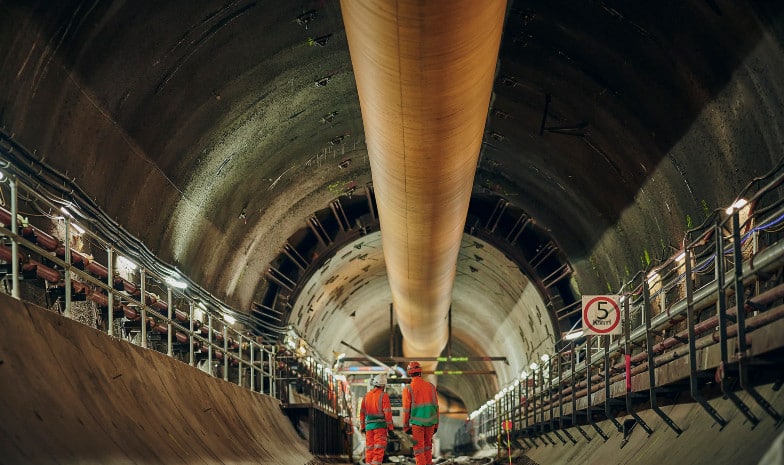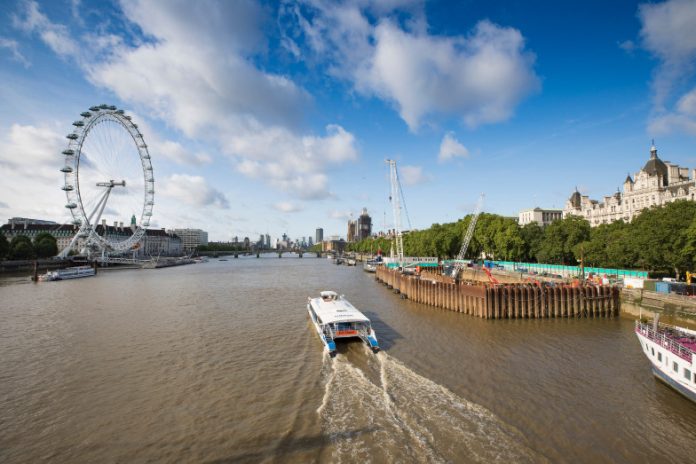Rainfall can put cities’ drainage systems under immense pressure, sometimes leading to flooding or sewage overspills. With climate change expected to increase the frequency and intensity of extreme weather events, ambitious action is critical.
Cities are developing strategies to improve water quality and become more climate resilient. At a conference in Brussels on March 6, speakers from the Belgian capital, London, Copenhagen and Paris presented their plans to tackle urban rainwater management.
Their interventions came as the United Nations puts the spotlight on water throughout the month of March, with World Water Day celebrated on March 22 and the UN 2023 Water Conference on March 22-24.
London’s Super Sewer
London relies on a 150-year-old Victorian sewer system built for a population less than half its current size of almost nine million. Even a light drizzle of rain causes untreated sewage to overflow, resulting in millions of tonnes of raw sewage spills into the River Thames each year.
To clean up the river, a 25km long ‘Super Sewer’ is being built to intercept, store and transfer sewage waste away. Its main tunnel will be as wide as three double decker buses and will sit between 30 – 66m deep.
“It’s a solution that will alleviate more than 95% of the worst sewage going into the River Thames,” explained Samantha Freelove, Legacy and Sustainability Manager at Thames Tideway Tunnel, the company in charge of building the sewer, at the Brussels conference organised by Canal It Up and BRAL with the support of Brussels Environment.

The London project is currently projected to cost 4.9 billion euros, and its financing is linked to its sustainability performance. Its legacy commitments have been mapped to the Sustainable Development Goals, and in particular SDG 6 (Clean water and sanitation) and SDG 11 (Sustainable cities and communities).
It has provided, for example, apprenticeships and training for young people; it hopes to improve biodiversity in the river; and it is creating seven areas of new public realm in London.
The project will be completed in 2025, and Thames Tideway Tunnel says the new sewer will protect the river for at least the next 100 years.
Cloudburst planning in Copenhagen
In 2011, Copenhagen was flooded by a huge cloudburst, an extreme amount of precipitation over a short period of time. In two hours, 150mm of rain fell, causing close to one billion euros worth of damage.
“It really showed us how vulnerable a city can be when it comes to climate change, and in that way it became a game changer for the city,” said Lykke Leonardsen, Head Director for Resilient and Sustainable City Solutions at the City of Copenhagen.
To protect the city against future floods, Copenhagen developed a 1.6-billion-euro urban rainwater management plan compromising 350 projects. It decided that expanding its existing sewer system would be expensive and disruptive, and instead set on transforming existing surface infrastructure to retain or transport water.
“You have to think smart. We’ve got parks and squares. These can be used for water storage, retention areas,” explained Lykke Leonardsen. When not raining, these areas create new public spaces for citizens and help to improve biodiversity.
In the city’s Enghave park, for example, a wall has been constructed that can store up to 23,000 m3 of water for 24 hours. In dry weather, the wall is a feature in the park. Sunken gardens elsewhere in the city also act as water storage. Tunnel solutions are used in the parts of the city where no opportunities exist for drainage solely at ground level.
The execution of the various projects is well under way and is expected to take 20 to 30 years.
Swimming in the Seine
The City of Paris wants the Seine to be swimmable by 2024. Today, two million m3 of polluted water flows annually to the river through sewage overflows. While this is a dramatic reduction from the 1980’s when 20,000,000 m³ of stormwater was discharged each year, the city has developed a 1.2-billion-euro plan to reduce the figure to zero.

Part of the plan is the construction of a stormwater basin under the Marie Curie garden in the southeast of the city, which has the capacity to retain the equivalent of 20 Olympic swimming pools of rainwater and therefore avoid discharges of polluted water. Local authorities are also working to resolve poor connections in people’s homes that currently lead to wastewater ending up in the river. Boats moored in the city must also comply with standards.
“The 2024 Olympic and Paralympic Games were a real catalyst for the city,” said Anita Ravlic from the city of Paris.
Several of the Olympic sports are hoped to be organised in the river, and the city wants to make the Seine accessible for all by 2025, with five bathing areas planned within Paris.
Brussels Water Management
In Brussels, 10 million m³ of sewage water is discharged yearly into the River Senne and the city’s canal.
“The challenge is not only to improve the quality of the water but also to provide a welcoming and resilient ecosystem for aquatic organisms,” explained Michael Antoine from Brussels Environment (Brussels-Capital Region Environment and Energy Agency).
As part of the draft Brussels Water Management Plan 2022-2027, proposed actions include removing obstacles that currently impact fish migration; renaturing banks; and improving the performance of wastewater treatment plants. Other measures include combatting direct discharges of polluted water and floating waste; reducing the impact of storm overflows and improving the performance of wastewater treatment plants. The plan is currently to a public inquiry.
Currently, there is no specific timeframe to reduce the 10 million m³ of sewage water spills. While other cities have short-term plans to address such issues, Brussels is taking a longer-term and step-by-step approach.
UN Water Conference
The UN 2023 Water Conference is a once-in-a-generation moment for the world to unite around water.
National governments and stakeholders from all levels of society will come together to commit to action. This Conference will launch the Water Action Agenda, which will include commitments from people around the world.
In his message for this year’s World Water Day, UN Secretary-General António Guterres calls water “the lifeblood of our world” and reminds us of our individual and collective roles to protect and sustainably use it.
“We don’t have a moment to lose. Let’s make 2023 a year of transformation and investment for humanity’s lifeblood.”
Find out more:
- UN 2023 Water Conference
- UN Water Conference: “We need to understand, value and manage water better”
- UN Water Action Decade (2018-2028)
The inclusion of an organisation on the United Nations Regional Information Centre (UNRIC) website does not necessarily reflect the views of UNRIC and does not imply its endorsement.




